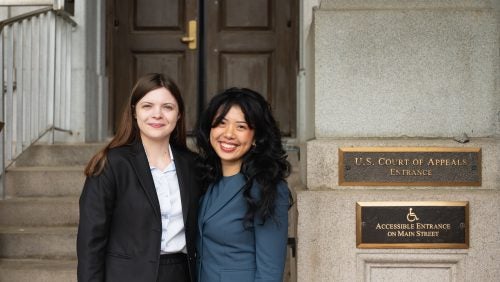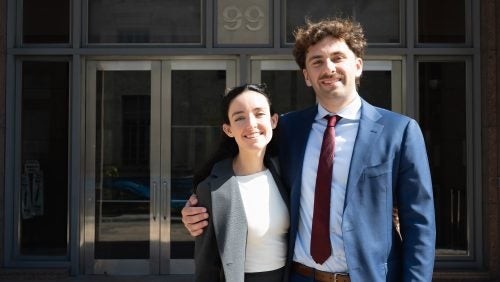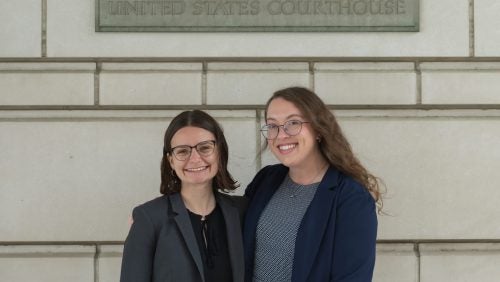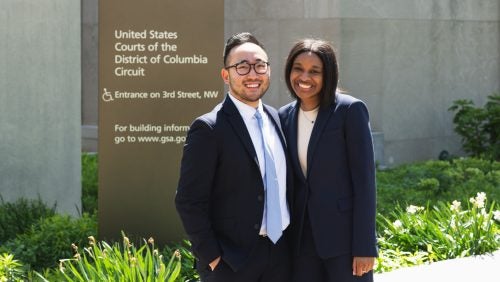Recent Case Highlights
Because the clinic takes cases by court appointment, the subject matter of the appeals varies from year to year. Here are a few recent highlights:
- The clinic represented an incarcerated person who sued prison officials under 42 U.S.C. § 1983 for violations of his Eighth Amendment rights after the officials failed to protect him from a brutal attack by another incarcerated person. The district court granted summary judgment for the prison officials. On appeal, a student team briefed the case, and a student argued it. The Fourth Circuit reversed the district court’s decision and remanded for further proceedings, holding that there were genuine disputes of fact as to whether one of the prison officials had been deliberately indifferent to the plaintiff’s risk of harm.
- The clinic represented a person who filed a 28 U.S.C. § 2255 motion alleging that he was denied his Sixth Amendment right to effective assistance of counsel in a criminal prosecution. The district court denied the petitioner’s pro se motion without holding a hearing. After briefing by a student team and a clinic fellow and argument by the fellow, the Fourth Circuit reversed the district court and remanded for a hearing. The Court held that the petitioner’s Fifth Amendment right against double jeopardy was violated when he was convicted and sentenced twice for a single conspiracy. The Court remanded for a hearing to determine whether the trial attorney was ineffective for failing to raise a double jeopardy challenge.
- The clinic was appointed as amicus in support of an incarcerated person who had sued prison officials for denial of medical care and a series of retaliatory assaults. The district court dismissed the lawsuit under the Prison Litigation Reform Act’s “three strikes” rule. A team of students briefed and argued the appeal. The D.C. Circuit reversed the district court and held that the plaintiff had satisfied the imminent danger exception to the three strikes rule, which meant his lawsuit should not have been dismissed on those grounds. The case was remanded to the trial court so the plaintiff could proceed with his claims.
- The clinic represented a person in his appeal from the dismissal of a motion under 28 U.S.C. § 2255 for ineffective assistance of counsel in a criminal case. A student team and clinical fellow briefed several issues, including counsel’s failure to litigate a Fourth Amendment motion to suppress or investigate the case before the petitioner pled guilty. After argument by the fellow, the Fourth Circuit reversed the district court and remanded the case for an evidentiary hearing on all of the petitioner’s ineffective assistance claims.
- The clinic was appointed by the D.C. Circuit as amicus in support of an employee who sued his former employer alleging that it had inflated his taxable income on his W-2 form, which led the Internal Revenue Service to miscalculate his tax liability. The district court granted summary judgment to the former employer. After briefing and oral argument by a team of students, the D.C. Circuit reversed the district court and held that the plaintiff had raised a genuine issue of material fact as to whether the former employer had willfully filed false W-2 forms. It therefore remanded for a trial on that issue.
- The clinic was appointed to represent a person in federal prison who sought compassionate release on the grounds that his mandatory minimum sentence would have been decades shorter had he been sentenced today, and that his evidence of extraordinary rehabilitation warranted compassionate release. After the district court denied his pro se motion, the Fourth Circuit appointed the clinic, and a student team briefed and argued the case. The Fourth Circuit reversed the district court’s denial of compassionate release. The court held that the sentencing disparity was a circumstance that could warrant compassionate release, and that the evidence of extraordinary rehabilitation required a remand to the district court with instructions to reduce the sentence by twenty years.



